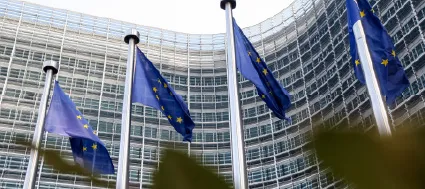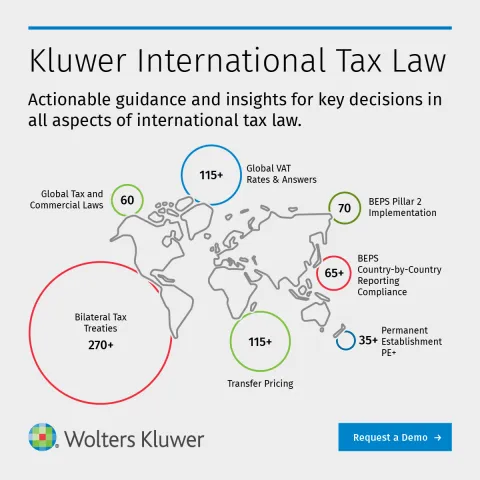The Contents of Highlights & Insights on European Taxation
November 3, 2025
CUSTOMS AND EXCISE, DIRECT TAXATION, EU LAW, INDIRECT TAXATION
Please find below a selection of articles published this month (October 2025) in Highlights & Insights on European Taxation, plus one freely accessible article.
Highlights & Insights on European Taxation (H&I) is a publication by Wolters Kluwer Nederland BV.
The journal offers extensive information on all recent developments in European Taxation in the area of direct taxation and state aid, VAT, customs and excises, and environmental taxes.
To subscribe to the Journal’s page, please click HERE
Year 2025, no. 10
TABLE OF CONTENTS
GENERAL TOPICS
– EU and Switzerland boost tax cooperation to combat tax evasion
(comments by the Editorial Board) (H&I 2025/298)
– Fira (C-215/24). Enforcing a custodial sentence for tax fraud. Court of Justice
(comments by Edwin Thomas) (H&I 2025/282)
DIRECT TAXATION, LEGISLATION
– BEFIT tax base standard – Economic and Monetary affairs committee MEPs adopt their position
(comments by the Editorial Board) (H&I 2025/297)
INDIRECT TAXATION, CASE LAW
– Hatar Diszkont (C-427/23). No VAT exemption for administering VAT refunds of third country customers that transport purchased goods outside of the EU. Court of Justice
(comments by Philippe Gamito) (H&I 2025/307)
– Svilosa (C-535/24). Actions taken by creditor to recover debt may not be classified as a ‘supply of services for consideration’. Court of Justice
(comments by Giorgio Beretta) (H&I 2025/288)
– Finanzamt Osterreich (TVA facturee par erreur a des consommateurs finals II) (C-794/23). No VAT liability for part that was incorrectly invoiced to non-taxable person. Court of Justice
(comments by Marja Hokkanen) (H&I 2025/285)
– W. (Exportation a l’insu de l’assujetti) (C-602/24). Exemption of exportation on initially declared intra-Community supply of goods which was made outside the EU by person acquiring goods. Court of Justice
(comments by Krzysztof Lasiński-Sulecki) (H&I2025/284)
CUSTOMS AND EXCISE
– AROCO (T-614/24). Excise duty exemption for ethyl alcohol used in flavourings depend on intended use, not demonstrable end use. General Court
(comments by Giorgio Emanuele Degani) (H&I2025/304)
MISCELLANEOUS
– Commission Recommendation on Increasing the Availability of Savings and Investment Accounts with Simplified and Advantageous Tax Treatment. European Commission
(comments by the Editorial Board) (H&I2025/302)
– European Commission confirms Omnibus on taxation and intention to retract proposals for directives
(comments by the Editorial Board) (H&I 2025/299)
– Statements of the Member States of the EU delivered at the first and second sessions of the Intergovernmental Negotiating Committee on the United Nations Framework Convention on International Tax Cooperation
(comments by the Editorial Board) (H&I2025/283)
ECHR
– Italmoda (16395/18). Supplementary VAT assessments for failure to comply with exemption rules did not amount to a penalty. ECHR
(comments by Edwin Thomas) (H&I 2025/303)
FREE ARTICLE
– AROCO (T-614/24). Excise duty exemption for ethyl alcohol used in flavourings depend on intended use, not demonstrable end use. General Court
(comments by Giorgio Emanuele Degani) (H&I2025/304)
Proportionality Over Formalism: Safeguarding Excise Exemptions for Flavourings
Premise
The judgment of the General Court of the European Union of 22 October 2025 in Case T-614/24, which rules out a general obligation to demonstrate ex post the actual use of ethyl alcohol incorporated in flavorings intended for foods and non-alcoholic beverages, provides an opportunity to reconsider the scope of the principle of proportionality in excise law. Proportionality is not a mere procedural criterion: within the Union’s legal framework it acts as a constitutional constraint on administrative action and as an interpretative parameter guiding the application of exemptions, ensuring that the exercise of control powers does not empty the statutory rule protecting fiscal neutrality.
Proportionality as a fundamental principle of Union law
The principle of proportionality requires that any intervention by public authorities be suitable, necessary and not excessive in relation to the legitimate objective pursued. In the context of excise duties, the objective is the prevention of fraud and the protection of revenue, but the means employed must respect the economic-teleological function of the exemptions established by EU law. Proportionality therefore not only limits the intensity of controls but conditions the very structure of documentary and evidential burdens that Member States may impose. When Union law recognizes an exemption based on the industrial or commercial destination of a product, proportionality requires that verification measures favor predetermined and objective elements rather than retroactive burdens that would make the exemption difficult to exercise.
Adequacy and necessity in verifying exemptions
Applying proportionality means assessing whether the information required from the operator is actually capable of preventing the risk of abuse and whether a less burdensome measure could achieve the same result. In the case of exemptions for alcohol incorporated in flavorings, the request for ex post proof of use is often disproportionate because it is not always decisive for the nature of the operation: the declared commercial destination, customs classification and contractual documentation already provide objective elements that can be verified in advance. Proportionality therefore requires administrations to adopt differentiated control criteria according to the risk profile, favoring traceability tools and administrative cooperation over invasive controls and generalized burdens.
Proportionality and the principle of the least restrictive measure
The principle of the least restrictive measure is a direct expression of proportionality: the authority must adopt the least burdensome measure among those that are effective. In the present context, this principle justifies the adoption of standardized documentary requirements, traceability registers and information-sharing mechanisms between customs and tax authorities, rather than imposing on producers the obligation to demonstrate retroactively the use of each lot. The least restrictive measure protects diligent operators by reducing unnecessary compliance costs and focuses public action on genuinely suspicious behaviors.
Proportionality and administrative burdens
Proportionality requires a cost-benefit assessment that takes into account the administrative burdens imposed on economic operators. Excessive obligations not only compress the free movement of goods and the competitiveness of EU undertakings but also create inefficiencies for the administration itself. Rules that require complex reporting and ex post verifications increase operational burdens without a proportionate improvement in fraud-fighting capacity. Proportionality therefore steers policy toward solutions that maximize deterrent effect while keeping administrative costs contained.
Protection of rights and effective remedies
Proportionality is linked to the right to effective remedies: preventive measures that suspend an exemption must be accompanied by guaranteed procedural safeguards and timelines compatible with the commercial nature of the activity. Proportionality implies that operators must have rapid instruments to challenge an administrative decision, including the possibility of lifting a precautionary measure if the preliminary verification proves unfounded. Balancing immediate revenue protection with safeguarding the right to exemption requires control mechanisms that do not disregard the protection of operators’ subjective rights.
Implications for administrative cooperation and guidelines
Proportionality encourages harmonization of control practices between customs and tax authorities and the adoption of clear interpretative guidelines. Administrative cooperation allows investigative efforts to focus on risk points and to use cross-checked information to limit invasive inspections. Guidelines that define suitable evidential elements, classification criteria and traceability practices are proportionate instruments to ensure legal certainty without compromising preventive effectiveness.
Balancing abuse prevention and legal certainty
Proportionality is the tool that preserves the balance between the need to prevent abuse and the necessity to guarantee legal certainty. In the flavorings sector, indiscriminate application of retroactive evidential burdens undermines the fiscal neutrality that the legislation intends to protect. Proportionality requires that interventions be calibrated to actual risk, that burdens be predetermined and rational, and that controls favor documentary transparency and traceability rather than automatic suspension of the exemption.
Conclusion
The T-614/24 judgment acquires full significance when read through the lens of proportionality, which in European Union law functions as a safeguard of equilibrium between public objectives and operators’ rights. Proportionality guides the choice of verification tools, limits unnecessary administrative burdens, promotes inter-authority cooperation and requires effective remedies in disputes. Translating this principle into practice means adopting targeted controls, predetermined documentary criteria and procedures that allow the exemption to perform its neutralizing fiscal function, without permitting the prevention of abuse to become a pretext for depriving the statutory right of its substance.
Dr. Giorgio Emanuele Degani
You may also like






